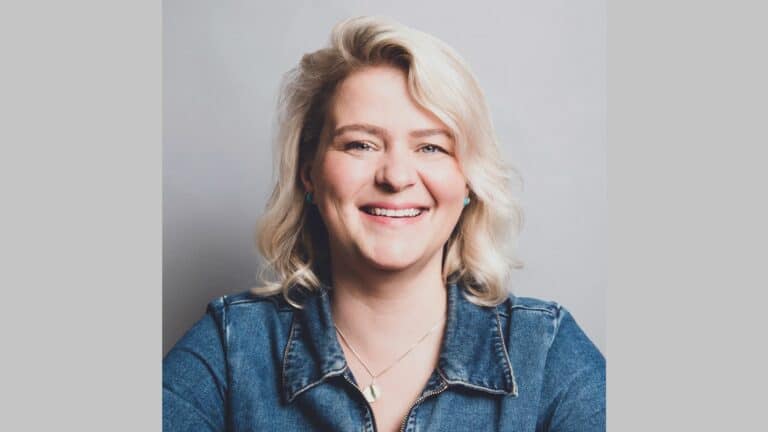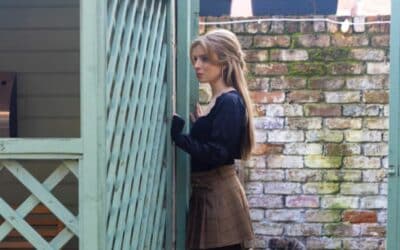Jessica Brown Meek is co-founder of Duck Soup Films, a Leeds-based production company that has produced the award-winning Lost Boys & Fairies.
In addition to co-exec producing the company’s shows, she is responsible for developing and executing business strategies and overseeing all of the company’s operations and procedures, as well as nurturing relationships with key talent and seeking out new projects for the slate alongside her fellow co-founders.
The company’s new coming-of-age drama Dreamers, which airs on Channel 4, was shot in and around Leeds. Duck Soup Films gave 10 Leeds-based people the opportunity to break into the broadcast industry on the drama after partnering with 4Skills and the National Film and Television School’s Northern Hub (NFTS Leeds) to provide paid full-time placements on the production.
From how she first entered the world of film and TV to building a career in the North, Jessica Brown Meek shares her career journey and savvy words of advice for those wanting to break into the industry…
How did you first get into your industry?
I loved watching telly and old films when I was growing up – I liked the escapism and with no real clue of what I wanted to do career-wise, I chose a degree that covered art, design and film which opened doors into the industry.
In my third year at the University of Northumberland, we had the option of writing a long dissertation or doing a work placement. As an essay dodger, it was a no-brainer and I managed to get a placement with a company called A19 Films in Sunderland, and when it ended they offered me paid work one day a week, which I did alongside my degree. That was my first proper foot in the door, leading to more work experience at Yorkshire TV and eventually paid employment.
What do you love about your job?
The people I get to work with, the variety, the relationships formed through shared experiences, the places it’s taken me, and the privilege of being my own boss. No two days are the same and there’s something incredible about seeing a project come to life, from an initial idea to being on screen. Watching a cast and crew work together to achieve a collective vision is magic. It’s no small feat, and I have huge respect for all the diverse disciplines, expertise and talent that make it all happen.
I’ve worked across soaps, kids’ TV, drama, documentaries, feature films, and commercials as I wanted to build a career in the North, so had to be flexible and push against the industry’s tendency to pigeonhole people into a specific genre. Breaking through those barriers isn’t easy, you need someone to give you a chance and that’s tough, especially now, but I’ve loved being able to do a bit of everything and feel lucky to have done so.
Who – or what – has inspired you in your career?
Before setting up Duck Soup Films, I had some brilliant bosses who encouraged me and, for some reason, liked having me around! But my biggest inspirations are my co-founders, Bekki Wray-Rogers and Libby Durdy. As a trio, we balance each other out, bring different strengths, and share the same values and mission to create meaningful, entertaining work. We’ve been through some amazing highs, tough lows, and everything in between, backing each other 100%. Running an indie isn’t easy at the best of times, and in today’s climate it’s even tougher, so I’m incredibly lucky to be doing it alongside two of the best.
What are the biggest challenges about your job?
Keeping up with an industry that’s constantly shifting and currently struggling. Developing great drama takes time, dedication, and nerves of steel. Talent is crucial, but luck and connections play a huge part too. Securing creative and financial backing takes perseverance and resilience and we have to be constantly adaptable and make tough decisions.
What skills have been the most crucial to you succeeding in your career so far?
I think being someone people can rely on and staying conscientious has been crucial. Having the confidence to ask questions is important – nobody knows everything, and most people are happy to share their knowledge. Once you know, you know! Adaptability is also key – things change constantly, so I’ve had to learn to go with it. While I’ve had some non-negotiables in terms of the work I take on, I’ve always been open to trying new things.
Attention to detail matters because trust is everything, and small things can make a big difference. Perseverance and patience have been essential too – doors don’t always open easily, so you have to keep knocking. Believing and caring about the work you do and the people you do it with makes the tough times worth it. Self-awareness in recognising my strengths and limitations has helped build strong collaborations and produce good work. And above all, empathy and people skills go a long way – everyone has their own challenges, so being kind and understanding is key.
What was your first salary and what could someone getting into the industry expect to earn nowadays?
I think I was on about £50 a day when I first started, but that was a long time ago! These days, a trainee on a drama would be looking at £650 – £700 a week, but it varies depending on the role and production budget.
What education or training would be most useful for someone looking to follow your career path?
Any job or experience that proves you’re reliable and hardworking is valuable, whether that’s washing pots or working behind a bar – showing up and doing the job well counts for a lot.
If you have a connection, use it. This industry isn’t an even playing field, so take every opportunity you can. Be prepared to start at the bottom and do every job well, no matter how small. One of my early work experiences involved standing at the end of a road for a week redirecting traffic and picking up cigarette ends – not exactly glamorous, but it got me on set, and opened a door.
Being computer-literate helps, as does the confidence to talk to people. Keep an open mind about what you want to do – there are so many roles in this industry and trying different things will help you figure out what suits you.
There are some fantastic practical educational courses out there, and training opportunities and schemes provided by the likes of ScreenSkills, Screen Yorkshire, NFTS – these are absolutely invaluable, and again, help you make connections.
What advice would you have for someone looking to follow your path?
- When starting out it’s important to consider all opportunities – no job is beneath you. The chance to observe people in different roles is invaluable for figuring out what you want to do.
- Find like-minded people – surround yourself with good people who share your passion.
- Work hard and take opportunities seriously – but don’t burn yourself out.
- Be curious and embrace change – the industry is unpredictable.
- Have a plan A, B, and C – stability is rare, so be prepared for ups and downs and give yourself options.
- Care about what you make – this job takes up a lot of your time, so it should mean something to you.
- Have confidence in your strengths and learn from others.
- Take the good experiences and build on them and learn from the bad.
- Get your foot in the door however you can, and when you do, take it seriously.
- Keep up with people in the industry whose work you admire as relationships are key.
Above all, stick to who you are and make space for others. The industry needs people who lift each other up.













